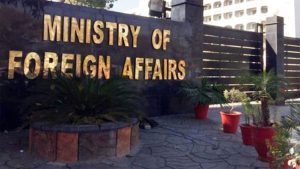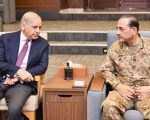The world is changing, the old and established Cold War formats of international relations where states formed exclusive alliances and blocs has faded. The world has evolved into a Global Village with a multitude of interdependencies between sovereign states. Pakistan is no exception.
Our geopolitical considerations have been dictated by a multitude of factors including religious extremism leading to long-drawn-out military operations to political instability to the weak economy, just to name a few. Due to a host of reasons, our institutions have been slow to react, realign and initiate a comprehensive and consolidated state response. The reasons for this also vary from a lack in a structured approach, lopsided priorities or political interferences.
An example of this is our nation’s civil service which has been affected significantly by this crisis-ridden environment. Unfortunately, a dogmatic and traditional approach to international relations has prevented focus on innovative and out-of-the-box solutions.
The previous government appointed several non-career diplomats based on their skills and ability to key ambassadorial posts. Some of these included Masood Khalid, Pakistan’s 3rd term ambassador in Beijing who has been instrumental in facilitating the CPEC vision; Maleeha Lodhi, the well-respected face of the country at the UN; Ali Siddiqui, the articulate and passionate entrepreneur in Washington; Vice Admiral (retd) Khan Hashmi Bin Siddique, Pakistan’s ambassador in Riyadh, etc.
In a surprising move, the PTI government has decided to recall many of these enterprising individuals. This was exemplified by Pakistan’s rock-bottom relations with the global superpower, the United States, at the start of the year when the Trump-led administration suspended nearly all of the $1.3 billion in annual security aid.
He also tweeted that Pakistan had “given us nothing but lies & deceit” while diplomats working at the Pakistani Embassy in Washington were barred from traveling outside of a 25-mile radius around the city without approval. All the while a career diplomat who was at the helm of the Pakistani Embassy in Washington failed to mitigate the situation.
Realising the need for drastic improvement, the previous government appointed Ali Jehangir as ambassador in May 2018 during a time period when the atmosphere between Pakistan and the US was one of distrust and tension.
Siddiqui presented a model for bolstering the Pak-US relations based on business and trade opportunities. In an interview with Bloomberg on Pak-US relations, he identified key areas of cooperation between the two states and opportunities for future growth. His efforts to bind together the economic interests of the two countries reflected his international exposure, background in business as well as government.
Similarly, the ambassador undertook efforts for cordial meetings between Foreign Minister Shah Mehmood Qureshi and Secretary of State Mike Pompeo, National Security Adviser John Bolton and leaders and members of high-powered Congressional Committees during the foreign minister’s UN trip to the US in October. Some believe Siddiqui’s closeness to Trump’s son-in-law Jared Kushner did the trick.
These efforts were reflected in Shah Mehmood’s statements post the visit that they had made “significant progress” and there were “visible change in how the US conducted talks this time”. He thanked Ali Siddiqui post the visit for his role.
The underlying theme is by no means an effort to discredit anyone. The civil services career officers have a history of producing best officers in all fields.
Now, however, the scenario has changed once more. In a sudden announcement, the PTI government approved the appointment of new ambassadors in the US, the UK, Canada, Saudi Arabia, Qatar, Dubai, Cuba, and Serbia.
Consistency is a key element for building relations and one that we need to focus on considerably. Only by having and following a defined policy and system can we push our narrative across to key stakeholders and for this to be successful we need to have in place people who can actually play a role in delivering the message. This could be persons who are not part of the traditional structure and could be based on their skill sets.
The world is changing, and we need people who bring a multitude of experiences and abilities to the table. In Britain, Jeremy Hunt, the UK Secretary of State for Foreign and Commonwealth Affairs, is inviting business leaders to become British ambassadors; Donald Trump, a real-estate tycoon, made it to the office of the president of the world’s leading superpower; while French President Emmanuel Macron was an investment banker.
The PTI government has focused on meritocracy — and rightly so. It is quintessential for the leadership to understand the fast-changing world where talent is currency. Former COAS Jehangir Karamat, a general appointed diplomat; Sherry Rehman, a journalist-turned-diplomat; and Dr Maleeha Lodhi made the world recognise their talent as diplomats. It is time to give the new breed a chance and let them take the country forward.














